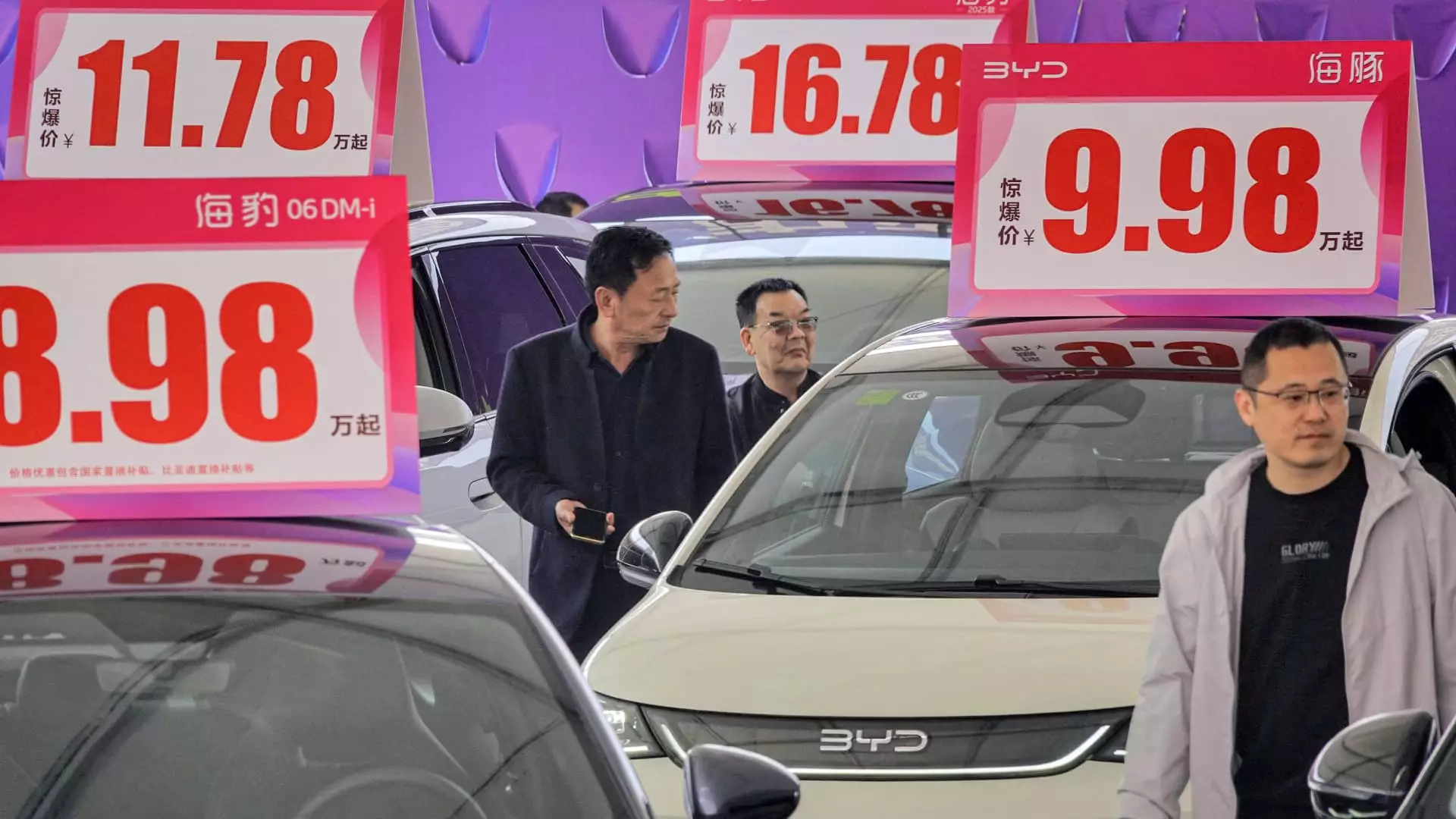In a breathtaking turn of events, China’s electric car market finds itself engulfed in a fierce price war, led by industry titan BYD. The company recently slashed prices of several lower-end battery-only and hybrid models by nearly 30%, thrusting the market into a state of palpable anxiety. The price cut on BYD’s Seagull, now retailing at a mere 55,800 yuan ($7,750), serves as a vital signal of a rapidly changing economic landscape. While price reductions can sometimes trigger excitement among consumers, in this case, they are raising alarms within the industry. Zhong Shi, an analyst from the China Automobile Dealers Association, described the industry as being in a state of “relatively large shock,” indicating that smaller automakers are grappling with concerns about their competitiveness.
The wider Chinese economy has been marred by sluggish growth and a decline in consumer demand. In response to these challenges, Beijing has introduced subsidies aimed at stimulating consumption, particularly in the new energy vehicle (NEV) sector. However, the price competition brought on by BYD’s aggressive pricing may exacerbate the imbalances in supply and demand. Robin Xing, Chief China Economist at Morgan Stanley, pointed out that the ongoing price cuts highlight a persistent supply-demand mismatch, affirming that inflation is likely to remain a distant dream for the foreseeable future.
Industry-Wide Turmoil: A Scarce Bright Spot in a Dismal Economy
With the electric vehicle sector previously being a beacon of hope for China’s economy, the recent upheaval poses serious potential setbacks. Automakers across the board, including established state-owned manufacturers, are feeling the heat. Historically, the Chinese automotive market has been robust, but as traditional internal combustion engine vehicles face significant declines in sales, the alarm bells are sounding for an industry once considered a reliable growth engine.
Great Wall Motors Chairman Wei Jianjun’s ominous comparison of the electric vehicle market to the notoriously unstable real estate sector further inflates concerns. As the infamous Evergrande crisis showcased, underlying weaknesses can erupt into full-blown financial catastrophes. This fear begs the question: just how fragile is the current electric vehicle market, particularly one buoyed by government subsidies and rapid growth?
BYD’s Desperate Maneuvers: A Sign of Deteriorating Stability?
The dramatic price cuts made by BYD reveal a company grappling with internal pressures and external competition, even as it boasts impressive net profit growth. While a 49% rise in profits to 14.17 billion yuan last year may appear commendable, the stark increase in total liabilities at over 60% raises red flags. Are these price slashes part of a broader strategy to drag competitors into a damaging tug-of-war, or are they indicative of a company cornered by a slippery market?
Fitch Managing Director Ying Wang suggested that the double-digit growth in electric vehicle sales isn’t necessarily a sign of market expansion; rather, it simply indicates that new energy vehicles are cannibalizing traditional fuel-powered cars. This pattern is worrisome in a country where overall auto sales have stagnated since 2018, raising questions about future sustainable growth in an increasingly saturated market.
International Implications: A Battle Beyond Borders
The ramifications of China’s internal price war extend far beyond its borders. The European Union and the United States are no strangers to the implications of Chinese competitiveness in the global car market. The EU has imposed tariffs on imports of China-made electric vehicles after scrutinizing the involvement of government subsidies. Meanwhile, the U.S. has enacted a punitive 100% duty on these vehicles, effectively barricading their entry into the second-largest automotive market in the world.
Recent developments further complicate the picture. According to JATO Dynamics, BYD outsold Tesla in Europe for the first time, while Tesla’s sales plummeted by 49%. These statistics highlight that tariffs are having a mixed impact and raise questions about how long companies like BYD can continue their aggressive pricing strategies amidst mounting international scrutiny.
Involution: The Specter of Non-Productive Business Competition
As China’s leaders increasingly emphasize the need to rectify what they term “involutionary” competition, BYD’s ventures into lower-cost markets could be seen as counterproductive. The term “involution” refers to a phenomenon where competition becomes more about cutting costs than enhancing product quality or innovation, potentially stifling long-term growth. With talks of comprehensive measures to address such competition echoing through government corridors, the precarious balance between aggressive pricing and sustainable business practices hangs in the air.
Simply put, BYD’s price gambit may be a double-edged sword. While it represents a proactive response to a tepid economy, it might also lead the industry into a dangerous cycle of devaluation and consumer complacency. As automakers grapple with their futures amidst daunting competition and shifting consumer expectations, one can only hope that the drive for innovation will prevail over the race to the bottom.

